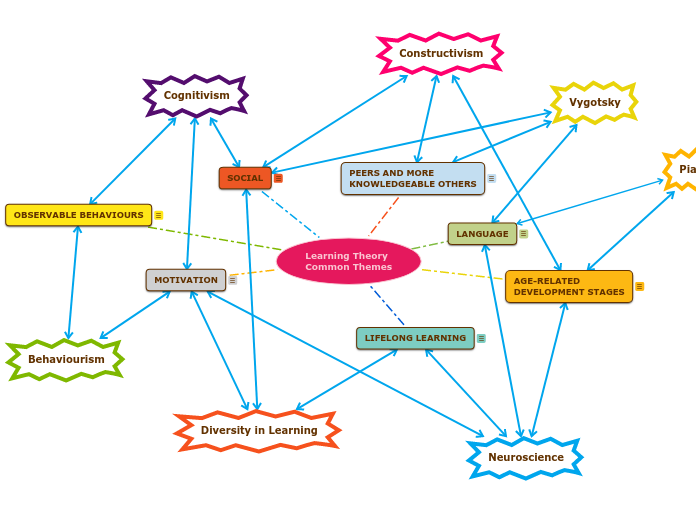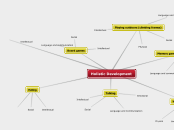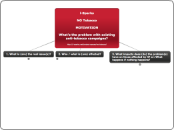by Meg Irwin 4 years ago
348
Learning Theory
Common Themes
Constructivist learning theory emphasizes the importance of social interactions and collaborative learning. Social cognitive theory highlights the dynamic relationship between social modeling and individual cognitive processes, while Vygotsky’
Open
LANGUAGE Piaget:
Stages of operations include language and communication as key identifiers
Vygotsky:
Culture and language in human development is essential. Semiotic Mediation - key to all aspects of knowledge construction. Through language, counting, art, writing, schemes, maps, mnemonic techniques, etc. Importance of language and culture on learning. Inner speech is integral to learning and thinking
Neuroscience:
Language is key to learning and involves a number of processes from multiple parts of the brain. Piaget Diversity in Learning Cognitivism Constructivism Vygotsky Behaviourism Neuroscience Learning Theory
Common Themes LIFELONG LEARNING Neuroscience:
Much is learned through observation Consolidation + memory + application = learning
Diversity in Learning:
Wide reaching availability of MOOCs MOOCs as free learning PEERS AND MORE
KNOWLEDGEABLE OTHERS Vygotksy:
Guided participation Zone of proximal development Collaborative learning
Constructivism:
Social Constructivism = ideas constructed though interaction with teacher and/or peers MOTIVATION Cognitivism:
Material and self-evaluative incentives
Behaviourism:
Pavlov's response to stimuli
Neuroscience:
Information is processed through filters to gain attention, which is influenced by perceived importance, novelty, intensity and movement. Growth mindset
Diversity in Learning:
Collaboration in cMOOCs leading to increased motivation to participate and add to discussion SOCIAL Social Cognitive Theory:
Social modelling Triadic reciprocal response
Vygotsky:
Dynamic interdependence of social and individual processes Collaborative learning Scaffolding
Constructivism:
Interactions with peers and teachers is essential Cooperative learning Scaffolding Internalization occurs more effectively when there is social interaction.
Diversity in Learning:
cMOOCs collaboration and networking Scaffolding OBSERVABLE BEHAVIOURS Behaviourism:
Assumption that human behvaiour is predictable Explicit behaviours can be observed and measured
Social Cognitive Theory:
Can learn by watching (observational learning) and observing the consequences of an action by someone else (vicarious reinforcement) AGE-RELATED
DEVELOPMENT STAGES Piaget:
Order of operations (sensorimotor, preoperational, concrete operations, formal operations)
Neuroscience:
Consolidation (development of synaptic responses) and brain development over time.
Constructivism:
Equilibration - knowledge shift from one stage to another (cognitive constructivism)









